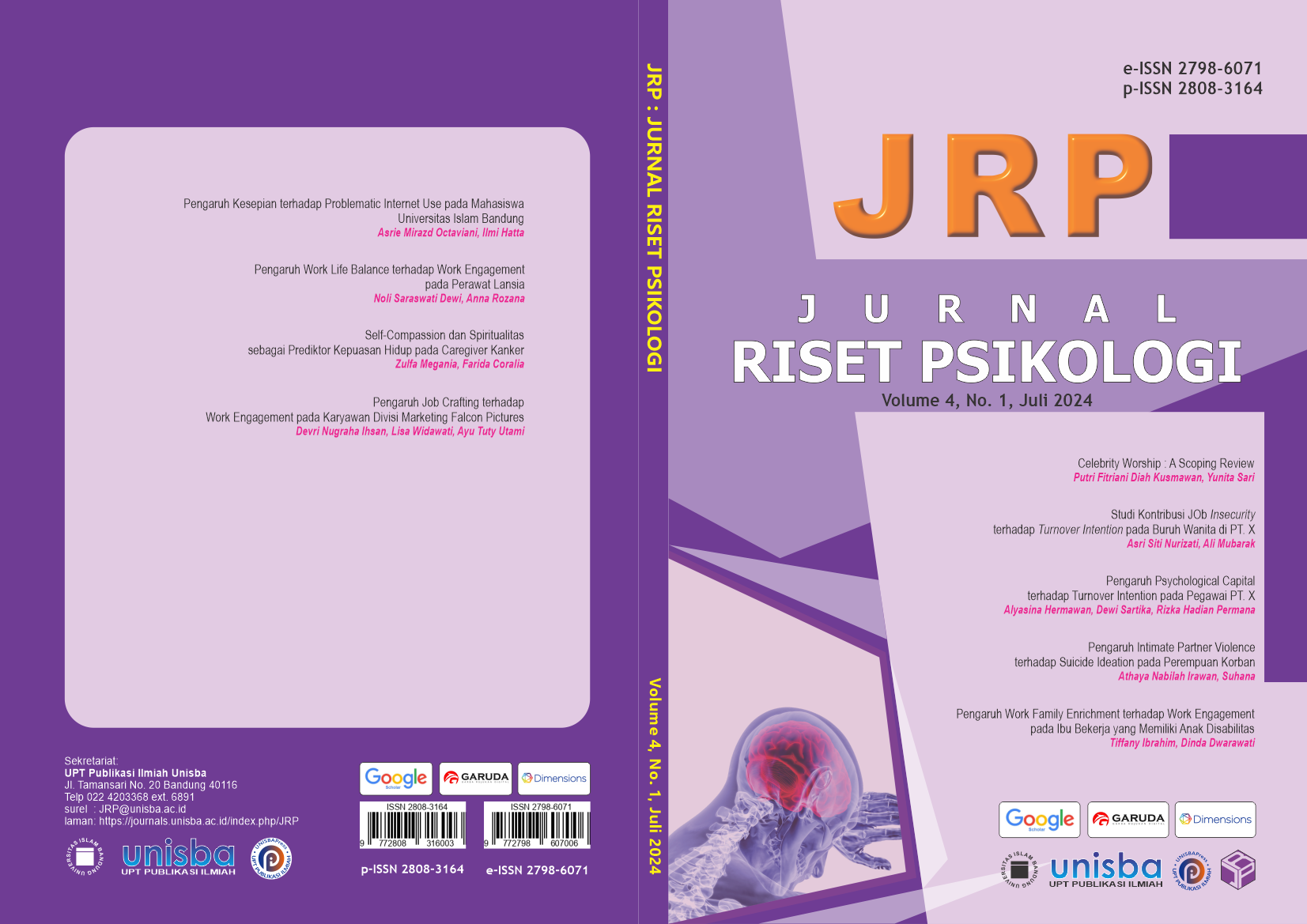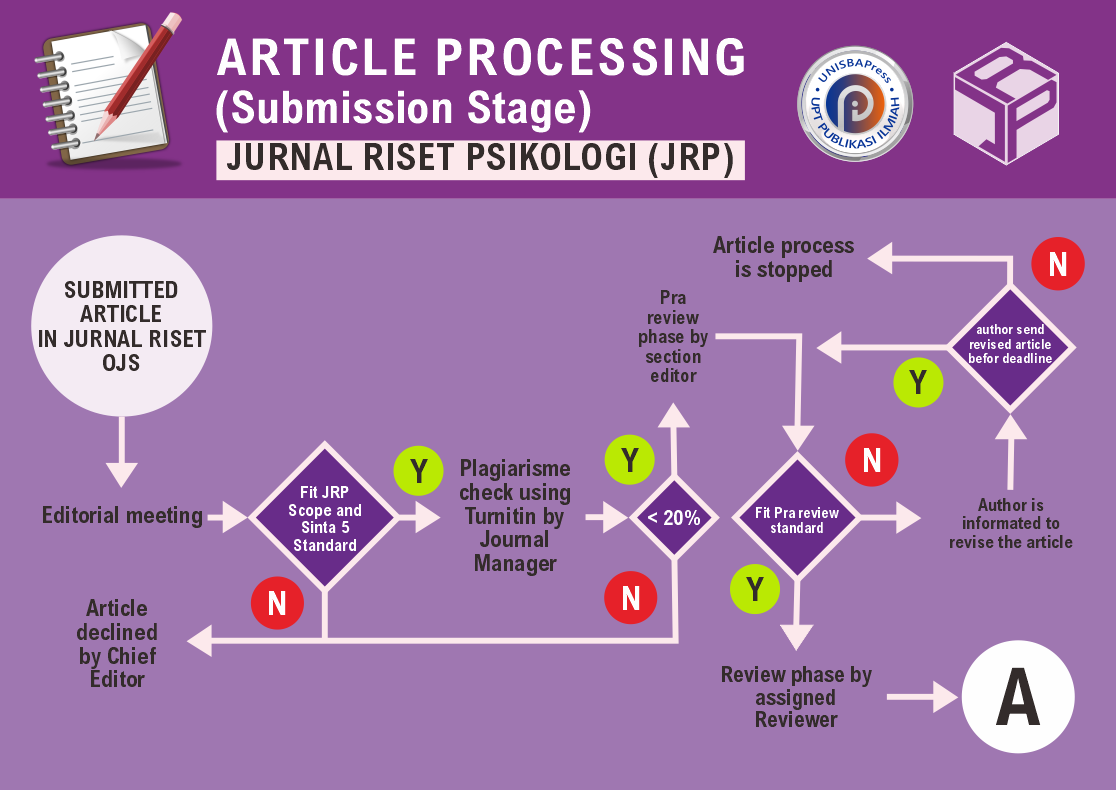Pengaruh Psychological Capital terhadap Turnover Intention pada Pegawai PT. X
DOI:
https://doi.org/10.29313/jrp.v4i1.3816Keywords:
Psychological Capital, Turnover Intention, PT. X EmployeesAbstract
Abstract. This research aims to see how closely psychological capital influences turnover intention among PT employees. X. The method used in this research is a quantitative method with data collection through questionnaires and multiple regression data analysis. The population in this study were employees at PT. X. The sampling technique used was random sampling technique and a sample of 334 people was obtained. The measuring instrument used is the Psychological Capital Questionnaire (PCQ) measuring instrument developed by Luthans (2007) and translated by Hafilda (2021). Meanwhile, the turnover intention measuring tool uses the three-item turnover intent questionnaire developed by Mobley et al. (1978) which has been adapted by Abid & Butt (2017) and translated by Farhan (2022). The research results show that 55.99% of PT. X has high psychological capital and 70.66% of PT employees. X has low turnover intention. Simultaneously, psychological capital influences turnover intention by 6.30%. Meanwhile, partially there are two dimensions of psychological capital, namely hope and resilience, which have a significant effect on turnover intention. Meanwhile, the other two dimensions, namely self-efficacy and optimism, do not significantly influence turnover intention.
Abstrak. Penelitian ini bertujuan untuk melihat seberapa erat pengaruh psychological capital terhadap turnover intention pada pegawai PT. X. Metode yang digunakan dalam penelitian ini yaitu metode kuantitatif dengan pengumpulan data melalui kuesioner serta analisis data regresi berganda. Populasi dalam penelitian ini adalah para pegawai di PT. X. Teknik sampling yang digunakan yaitu teknik random sampling dan didapatkan sampel sebanyak 334 orang. Alat ukur yang digunakan adalah alat ukur Psychological Capital Questionare (PCQ) yang dikembangkan oleh Luthans (2007) dan telah diterjemahkan oleh Hafilda (2021). Sementara alat ukur turnover intention menggunakan three-item turnover intent questionnaire yang dikembangkan oleh Mobley et al. (1978) yang telah diadaptasi oleh Abid & Butt (2017) dan diterjemahkan oleh Farhan (2022). Hasil penelitian menunjukkan bahwa 55,99% pegawai PT. X memiliki psychological capital yang tinggi dan 70,66% pegawai PT. X memiliki turnover intention yang rendah. Secara simultan, psychological capital berpengaruh terhadap turnover intention berpengaruh sebesar 6.30%. Sedangkan secara parsial terdapat dua dimensi psychological capital yaitu hope dan resiliecy yang berpengaruh secara signifikan terhadap turnover intention. Sementara dua dimensi lainnya yaitu self-efficacy dan optimism tidak berpengaruh secara signifikan terhadap turnover intention.
References
C. V. Pitoy, “Analisis Strategi Bersaing Dalam Persaingan Usaha Bisnis Document Solution (Studi Kasus Pada PT. Astragraphia, Tbk Manado),” Jurnal Berkala Ilmiah Efisiensi, vol. 16, no. 3, pp. 302–312, 2016.
M. N. K. Gumilang and A. Baidun, “Pengaruh Kepuasan Kerja Dan Stres Kerja Terhadap Intensi Turnover,” Jourmal Of Psychology, vol. 19, no. 2, pp. 265–281, 2014.
M. E. M. Barak, A. Levin, J. A. Nissly, and C. J. Lane, “Why Do They Leave? Modeling Child Welfare Workers’ Turnover Intentions,” Child Youth Serv Rev, vol. 28, no. 5, pp. 548–577, 2006.
S. L. Boyar, C. P. Maertz Jr, A. W. Pearson, and S. Keough, “Work-Family Conflict: A Model Of Linkages Between Work And Family Domain Variables And Turnover Intentions,” Journal of managerial Issues, vol. 1, no. 1, pp. 175–190, 2003.
W. H. Mobley, Pergantian Karyawan: Sebab, Akibat dan Pengendaliannya (Terjemahan). Jakarta: PT Pustaka Binaman Pressindo, 2011.
N. N. Marhamah, A. H. D. Seno, and H. S. Nugraha, “Pengaruh Beban Kerja dan Kompensasi terhadap Turnover Intention (Studi pada Karyawan Bagian Sewing PT. Sandang Asia Maju Abadi),” Jurnal Ilmu Administrasi Bisnis, vol. 11, no. 3, pp. 551–557, 2022.
Mobley, H. William, S. O. Horner, and A. T. Hollingswort, “Evaluasi Prekursor Perputaran Pegawai Rumah Sakit,” Jurnal Psikologi Terapan, vol. 63, no. 4, pp. 408–414, 1978.
E. Rivaldi and J. Sadeli, “Investigating The Effects Of Psychological Capital On Turnover Intention,” KnE Social Sciences, vol. 1, no. 2, pp. 903–916, 2020.
K. TaeGoo, O. M. Karatepe, L. GyeHee, L. SeungJae, H. KyungSuk, and X.-J. Cui, “Does Hotel Employees’ Quality Of Work Life Mediate The Effect Of Psychological Capital On Job Outcomes?,” International Journal of Contemporary Hospitality Management, vol. 29, no. 6, pp. 1638–1657, 2017.
O. M. Karatepe and G. Karadas, “The Effect Of Psychological Capital On Conflicts In The Work–Family Interface, Turnover And Absence Intentions,” Int J Hosp Manag, vol. 43, no. 1, pp. 132–143, 2014.
A. F. Ramadhani and A. Mubarak, “Studi Kontribusi Perceived Organizational Support terhadap Employee Well-Being,” Jurnal Riset Psikologi, pp. 125–130, Dec. 2023, doi: 10.29313/jrp.v3i2.2766.
J. B. Avey, F. Luthans, and C. M. Youssef, “The Additive Value Of Positive Psychological Capital In Predicting Work Attitudes And Behaviors,” J Manage, vol. 36, no. 2, pp. 430–452, 2010.
M. Larson and F. Luthans, “Potential Added Value Of Psychological Capital In Predicting Work Attitudes,” J Leadersh Organ Stud, vol. 13, no. 2, pp. 75–92, 2006.
F. Luthans, C. M. Youssef, and B. J. Avolio, “Psychological Capital: Investing And Developing Positive Organizational Behavior,” Positive organizational behavior, vol. 1, no. 2, pp. 9–24, 2007.
H. P. Iskandar and M. I. Hatta, “Pengaruh Psychological Capital terhadap Employee Engagement dengan Quality of Worklife sebagai Mediator,” in Bandung Conference Series: Psychology Science, 2022, pp. 408–416.
G. Abid and T. Butt, “Expressed Turnover Intention: Alternate Method For Knowing Turnover Intention And Eradicating Common Method Bias,” International Letters of Social and Humanistic Sciences, vol. 78, no. 2, pp. 18–26, 2017.
W. H. Mobley, S. O. Horner, and A. T. Hollingsworth, “An Evaluation of Precursors Of Hospital Employee Turnover,” Journal of Applied psychology, vol. 63, no. 4, pp. 408–416, 1978.
M. Farhan, “The Effect of Working Capital Turnover on Profitability of Plantation Companies Listed on the Indonesia Stock Exchange 2017-2020 Period,” Economic and Business Management International Journal (EABMIJ), vol. 4, no. 01, pp. 71–76, 2022.
M. Çelik, “The Effect Of Psychological Capital Level Of Employees On Workplace Stress And Employee Turnover Intention,” Innovar, vol. 28, no. 68, pp. 67–75, 2018.
N. Arora and N. Dhiman, “Influence Of Psychological Capital On Turnover Intentions: Empirical Evidence From Indian Paramedics,” International Journal of Work Innovation, vol. 2, no. 4, pp. 247–256, 2020.













